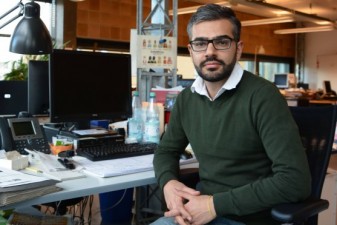
15/04/2015 17:15
“The Armenian Genocide: Breaking the Silence”. An unprecedented liturgy is expected in Germany
Ahead of the 100th anniversary of the Armenian Genocide Aysor.am presents a special project within which we shall consider cultural, scientific and social projects implementing these days.

Today we talked to an expert of Turkish studies, journalist, German “Tageszeitung” correspondent Tigran Petrosian.
- What changes can be expected from the Germany's political arena ahead of the 100th anniversary of the Armenian Genocide?
- The discussion of the new project about Armenian Genocide that lasts 65 minutes is expected in Bundestag on April 24. Left parliamentary faction proposes to adopt a new formula using the word “genocide”. The Greens are in favor of this initiative. There is a number of MPs from the ruling coalition (CDU / CSU and the Social Democrats), who also demands a clear stance on 1915 massacres as genocide. It seems that German media have rushed to calm the passions in this issue. Specifically “Tagesspiegel” newspaper wrote that the word “genocide” should come out from the project under the coalition and the MFA pressure. On the other hand, it seems that there is also German president's will to call a spade a spade. On April 23, German President Joachim Gauck will participate in the liturgy in memory of the victims of Armenian Genocide in Berlin Cathedral. This is an unprecedented event in German history, when the president participates in such procedures.
- These days Turkish and Armenian journalists are in Berlin.The meetings are held in your newspaper’s editorial. What specific results do you expect?
- 15 journalists from Turkey and Armenia, including journalist of Aysor.am get acquainted with Germany's past and present, Holocaust history, have meetings in Bundestag and the Foreign Ministry. At the end of the project the journalists will publish their articles on Armenian genocide in German newspapers. It is noteworthy that we have journalists from Nagorno-Karabakh. Thanks to editor of “Tageszeitung” for Foreign Affairs Barbara Oertel for such program.
- How do you assess the role of Armenian communities in recognition of Genocide?
-Genocide commemoration eventsare organized almost in all German cities where Armenians live. Of course, any contribution should be appreciated in promoting the recognition process. But the result will be more visible if the works are concentrated. Unfortunately, the Armenian communities are not united. And this is not an exception for Germany. Of course it is commendable that the organizations are increasing, but on the other hand, the dissolution becomes more evident. Armenian Genocide events are organized in Berlin almost every day, however, many people do not consider appropriate to be united in protests. Unfortunately, the slogan “I will listen to Komitas in my community” often can be heard.It seems that Armenians like to go for candle lightingmore than to protest in streets.
In recent months Embassy of Armenia in Germany actively tries to create a common ground for cooperation between the institutions. In February the event held in the Berlin parliament received a great response. It was organized by the Embassy in cooperation with the Armenian community in Berlin. It seems a new trend is formed in which the embassy is in the role of inviter.
- Is the theme ‘’Armenian Genocide” out of the scopes and how are Germans involved in the recognition of Genocide?
- Indeed, not only the Armenian factor should be conditioned for success. Rather large works are being carried out for Genocide recognition and generally in subject matter of cognition. Maxim Gorki Theatre in Berlin, with the repertoire of Armenian themes, is always full. German Historical Museum, Potsdam Lepsius house and a number of other institutions organize international conferences on Genocide.
The recognition committee with the head of Tessa Hofmann, who unites Armenians, Turks, Kurds, Greek and Assyrian for one reason only: it is to act against genocide, exerts great efforts.
The events held by these organizations should probably be estimated more adventurous, for example, the traditional demonstration in front of Berlin's largest mosque Shehitlik. The place is not chosen accidentally: Genocide perpetrators Beaheddin Shakirn and Jemal Azmi are buried in the courtyard of this Turkish mosque.
- German responsibility in Genocide is mostly spoken in Germany. Can this fact be considered the beginning of a new dispute or not?
- I’d rather say a new beginning of cognition. Yet in 2005 the German responsibility is mentioned in Bundestag resolution. This is not a new thing, it is only spoken much today. We come up with this kind of coverage very frequently in German media.
German journalist Jurgen Gotschlich’s book called "Support for the genocide. Germany's role in the extermination of Armenians” has been recently published. This fact is another important feature of Germany's Genocide recognition process.
The project was prepared with the assistance of the Information and Analytical Center of the Armenian Government Staff.








